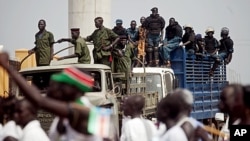U.S. Ambassador to the United Nations Susan Rice says Saturday’s ceremonies marking the independence of South Sudan are historic events, but also a fragile moment, fraught with problems. Rice will lead a high-level U.S. delegation to the July 9 festivities in the southern capital, Juba.
Rice’s comments reflect the cautious attitude of the Obama administration about the Juba events, which occur with major elements of Sudan’s 2005 north-south Comprehensive Peace Agreement (CPA) still unresolved.
The U.N. envoy and cabinet member will head a bipartisan U.S. delegation that includes former Secretary of State Colin Powell, a key figure in CPA negotiations, Assistant Secretary of State for African Affairs Johnnie Carson and U.S. envoy to Sudan Princeton Lyman.
At a press event Thursday, Rice listed outstanding CPA issues, including the disputed status of Abyei and other north-south border areas, citizenship issues in those regions, and a mechanism to share oil revenues between the Sudanese government in Khartoum and the soon-to-be Republic of South Sudan.
“We believe the parties need to urgently resolve these remaining issues," said Rice. "In the meantime, it’s critical that the parties cooperate on such key issues as oil and citizenship in order to avoid major economic shocks or social upheaval. Allowing these issues - including the final status of Abyei - to linger without resolution for any length of time could swiftly destabilize the future relationship between these two states.”
Rice lamented the insistence of the Khartoum government that U.N. peacekeeping troops leave the violence-torn border region of Southern Kordofan, Blue Nile state, and other border areas by July 9. She said that extending the peacekeeping presence is vital to support ceasefire efforts and protect civilians, and that intensive diplomacy is underway at the United Nations to try to persuade Khartoum to drop its demand.
Rice and Assistant Secretary of State Carson denied giving the emerging new southern state preferential treatment over Khartoum and said a “roadmap” to normal U.S. relations with Sudan remains on the table, if Khartoum fully implements the CPA.
Carson said the United States wants good relations with both states and wants them to be viable and good neighbors to one another.
“The long-term political and economic success of the south is dependent upon having a strong, politically stable and economically viable partner in the north," Carson said. "And the long-term viability of Khartoum’s government is dependent upon having a politically stable and economically prosperous partner in the south. Both of these countries will, in fact, remain very, very dependent upon one another for a long period of time.”
The American delegation in Juba will attend a ribbon-cutting ceremony in which the U.S. diplomatic mission in the south will be officially transformed into a full embassy.
The deputy administrator of the U.S. Agency for International Development (USAID), Donald Steinberg, said the United States will host a conference in Washington in September to promote South Sudan as an investment destination.
He said the new country, which has major oil resources, does not need a large inflow of foreign aid, but that it does require help in developing an open, corruption-free economy.
Steinberg said the Washington meeting will not be part of a pledging conference, but he indicated that the United States will announce a new developmental aid package for the south exceeding the $300 million provided during the past year.
US: South Sudan Separation a 'Fragile Moment'




